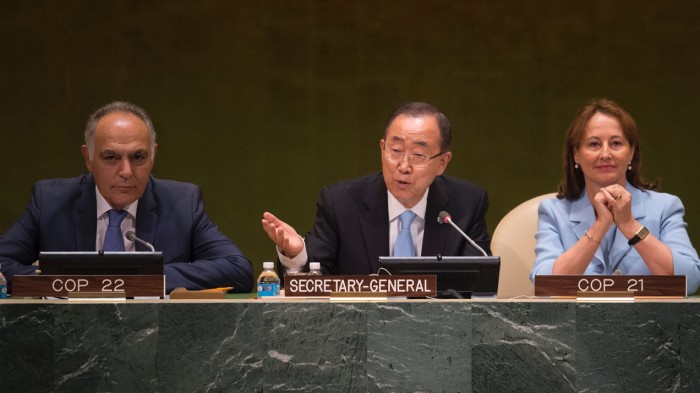The Paris Climate Accord Just Passed a Crucial Threshold
In case you haven’t noticed, it’s getting hot in here. “Here” being Earth. July and August both set records for the hottest ever, and 2016 is all but guaranteed to be the warmest year on record. But if we’re lucky, what really sets this year apart is that it could be the moment when we as a civilization finally decided to put a stop to global warming.
That was the take-home message from the United Nation’s General Assembly meeting today, where Secretary General Ban Ki-moon led the announcement that an additional 31 countries have signed on to the Paris climate accord. That brings the total number of countries formally on board to 60, accounting for nearly 48 percent of global greenhouse gas emissions.
In order for the agreement made last year at the UN’s COP 21 climate meeting to go into effect, 55 countries representing 55 percent of emissions must sign on. With one of the two major thresholds reached and the other near at hand, Ban told the assembly he was “ever more confident” that the accord would be ratified this year—perhaps even before the next UN climate meeting in November.

While it would be a landmark achievement, meeting the agreement’s goal of limiting global warming to 2 °C above pre-industrial levels will require a Herculean effort. For one thing, we’re already almost halfway there. And while global emissions have dropped a bit, the progress is fragile, and emissions in developing countries are expected to keep growing through the middle of the next decade.
What’s more, a recent UN study suggests that hitting the 2 °C goal is going to cost around $90 trillion over the next 15 years (to say nothing of the Paris agreement’s 1.5 °C “aspirational” goal). There’s an argument to be made that that’s indeed possible, and making the cessation of global warming a matter of international law will certainly help. But that same argument says that a bunch of world leaders signing laws won’t be anywhere close to enough—private capital is going to need to step in big time.
If Ban is right and the Paris agreement does go into effect sooner rather than later, it will be an encouraging symbol of international will to fight one of the greatest threats facing our planet. But on its own that’s all it will be: a symbol. Whether or not it translates into action will be decided ultimately not by international fiat, but by the world’s national and local governments stepping up and realizing that taking steps to ward off warming will help create one of the most important things any government can bestow on its people: an environment in which to thrive.
(Read more: The Guardian, “Have Global CO2 Emissions Peaked?” “Six Months after Paris Accord, We’re Losing the Climate-Change Battle”)
Keep Reading
Most Popular
Large language models can do jaw-dropping things. But nobody knows exactly why.
And that's a problem. Figuring it out is one of the biggest scientific puzzles of our time and a crucial step towards controlling more powerful future models.
The problem with plug-in hybrids? Their drivers.
Plug-in hybrids are often sold as a transition to EVs, but new data from Europe shows we’re still underestimating the emissions they produce.
Google DeepMind’s new generative model makes Super Mario–like games from scratch
Genie learns how to control games by watching hours and hours of video. It could help train next-gen robots too.
How scientists traced a mysterious covid case back to six toilets
When wastewater surveillance turns into a hunt for a single infected individual, the ethics get tricky.
Stay connected
Get the latest updates from
MIT Technology Review
Discover special offers, top stories, upcoming events, and more.